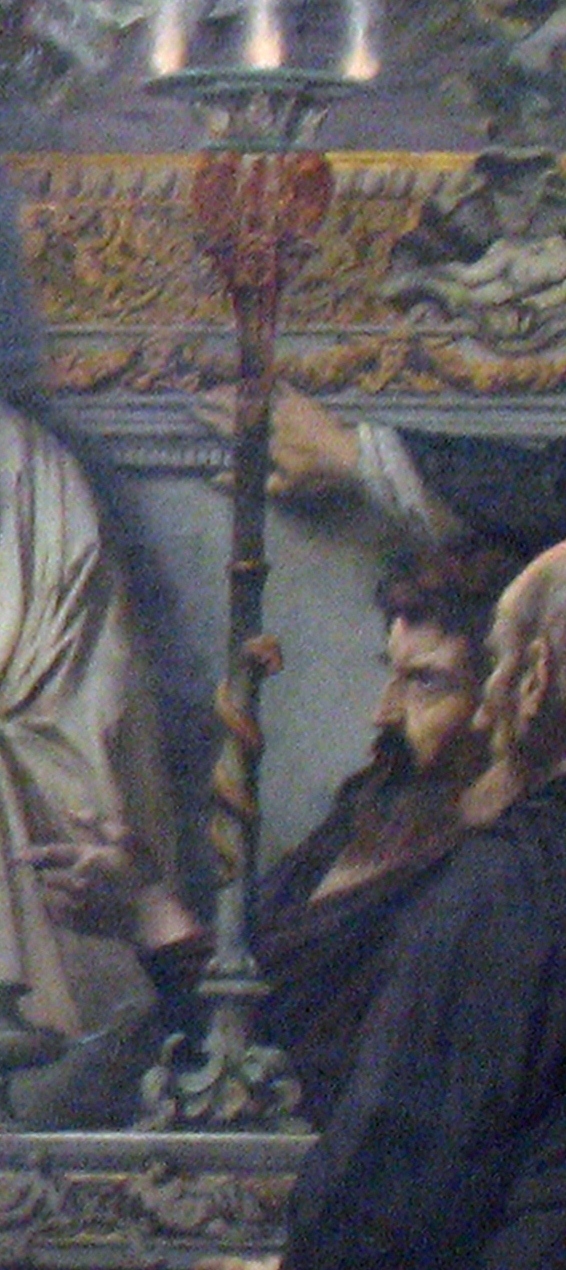Eryximachus on:
[Wikipedia]
[Google]
[Amazon]
 Eryximachus, son of Acumenus (;
Eryximachus, son of Acumenus (;
 Eryximachus, son of Acumenus (;
Eryximachus, son of Acumenus (; Greek
Greek may refer to:
Greece
Anything of, from, or related to Greece, a country in Southern Europe:
*Greeks, an ethnic group.
*Greek language, a branch of the Indo-European language family.
**Proto-Greek language, the assumed last common ancestor ...
: Ἐρυξίμαχος Ἀκουμένου ''Eruxímachos Akouménou''; c. 448 – late 5th century or early 4th century BCE) was an ancient Athenian physician
A physician (American English), medical practitioner (Commonwealth English), medical doctor, or simply doctor, is a health professional who practices medicine, which is concerned with promoting, maintaining or restoring health through th ...
who is best remembered for his prominent role in Plato
Plato ( ; grc-gre, Πλάτων ; 428/427 or 424/423 – 348/347 BC) was a Greek philosopher born in Athens during the Classical period in Ancient Greece. He founded the Platonist school of thought and the Academy, the first institution ...
's ''Symposium
In ancient Greece, the symposium ( grc-gre, συμπόσιον ''symposion'' or ''symposio'', from συμπίνειν ''sympinein'', "to drink together") was a part of a banquet that took place after the meal, when drinking for pleasure was acc ...
''. It is likely that he was indicted in the mutilation of the Herms Herms is a surname and given name. Notable people with the name include:
*George Herms (born 1935), American artist
* René Herms (1982-2009), German middle-distance runner
*Herms Niel
Ferdinand Friedrich Hermann Nielebock (17 April 1888 – 16 ...
, a domestic Athenian conflict during the Peloponnesian War
The Peloponnesian War (431–404 BC) was an ancient Greek war fought between Athens and Sparta and their respective allies for the hegemony of the Greek world. The war remained undecided for a long time until the decisive intervention of th ...
.Debra Nails
Debra Nails (born November 15, 1950) is an American philosophy professor who taught at Michigan State University. Nails earned her M.A. in philosophy and classical Greek from Louisiana State University before going on to earn a Ph.D. in philosophy ...
, ''The People of Plato'', Indianapolis: Hackett Publishing, 2002; pp. 134–135
Life
The son of the physician Acumenus, Eryximachus was born in the mid-5th century BC. Set approximately in 433/2, Plato's ''Protagoras
Protagoras (; el, Πρωταγόρας; )Guthrie, p. 262–263. was a pre-Socratic Greek philosopher and rhetorical theorist. He is numbered as one of the sophists by Plato. In his dialogue '' Protagoras'', Plato credits him with inventing the r ...
'' dialogue includes a depiction of his close friendship with Socrates
Socrates (; ; –399 BC) was a Greek philosopher from Athens who is credited as the founder of Western philosophy and among the first moral philosophers of the ethical tradition of thought. An enigmatic figure, Socrates authored no te ...
' student Phaedrus, a friendship that continued into the dramatic time of the '' Phaedrus'' dialogue some 15 years later. His wealth and social status are unclear from the extant sources.
An Eryximachus is mentioned in Andocides
Andocides (; grc-gre, Ἀνδοκίδης, ''Andokides''; c. 440 – c. 390 BC) was a logographer (speech writer) in Ancient Greece. He was one of the ten Attic orators included in the "Alexandrian Canon" compiled by Aristophanes of Byzantium an ...
' ''On the Mysteries'' speech as among those indicted in the mutilation of the Hermes and profanation of the Eleusinian mysteries
The Eleusinian Mysteries ( el, Ἐλευσίνια Μυστήρια, Eleusínia Mystḗria) were initiations held every year for the cult of Demeter and Persephone based at the Panhellenic Sanctuary of Elefsina in ancient Greece. They are the " ...
, two tumultuous events on the eve of the ill-fated Sicilian Expedition
The Sicilian Expedition was an Athenian military expedition to Sicily, which took place from 415–413 BC during the Peloponnesian War between Athens on one side and Sparta, Syracuse and Corinth on the other. The expedition ended in a devast ...
in 415. While there is no clear confirmation that this Eryximachus is the physician, there are numerous pieces of circumstantial evidence, including Phaedrus' role and Eryximachus' appearance in Plato's ''Symposium'' alongside others involved in these incidents. It is unclear whether he was among those executed because of the event, but the historical record lacks later references to him.
In Plato
While he is present silently in the ''Protagoras'' and receives mention in the ''Phaedrus'', his most significant appearance in Plato's writing comes in the ''Symposium''. Here he instigates and contributes to the event's extended discourse on the godEros
In Greek mythology, Eros (, ; grc, Ἔρως, Érōs, Love, Desire) is the Greek god of love and sex. His Roman counterpart was Cupid ("desire").''Larousse Desk Reference Encyclopedia'', The Book People, Haydock, 1995, p. 215. In the earli ...
and the phenomena associated with this god. In his speech, he uses the language of his doctor's craft to describe love in bodily terms. While some have dismissed his Platonic character as arrogant, pedantic, and a figure of comedic fun, others have argued for his role as a serious contributor to the discourse, or even attributed traditional Platonic philosophical values to his medical arguments.Ronald Ross, "A Doctor and a Scholar: Rethinking the Philosophic Significance of Eryximachus in the ''Symposium''", ''Stance'', Vol. 2, April 2009
See also
*List of speakers in Plato's dialogues
following is a list of the speakers found in the dialogues traditionally ascribed to Plato, including extensively quoted, indirect and conjured speakers. Dialogues, as well as Platonic '' Epistles'' and ''Epigrams'', in which these individuals ap ...
References
{{reflist, 2 5th-century BC Athenians 5th-century BC Greek physicians Ancient Greeks accused of sacrilege Dialogues of Plato